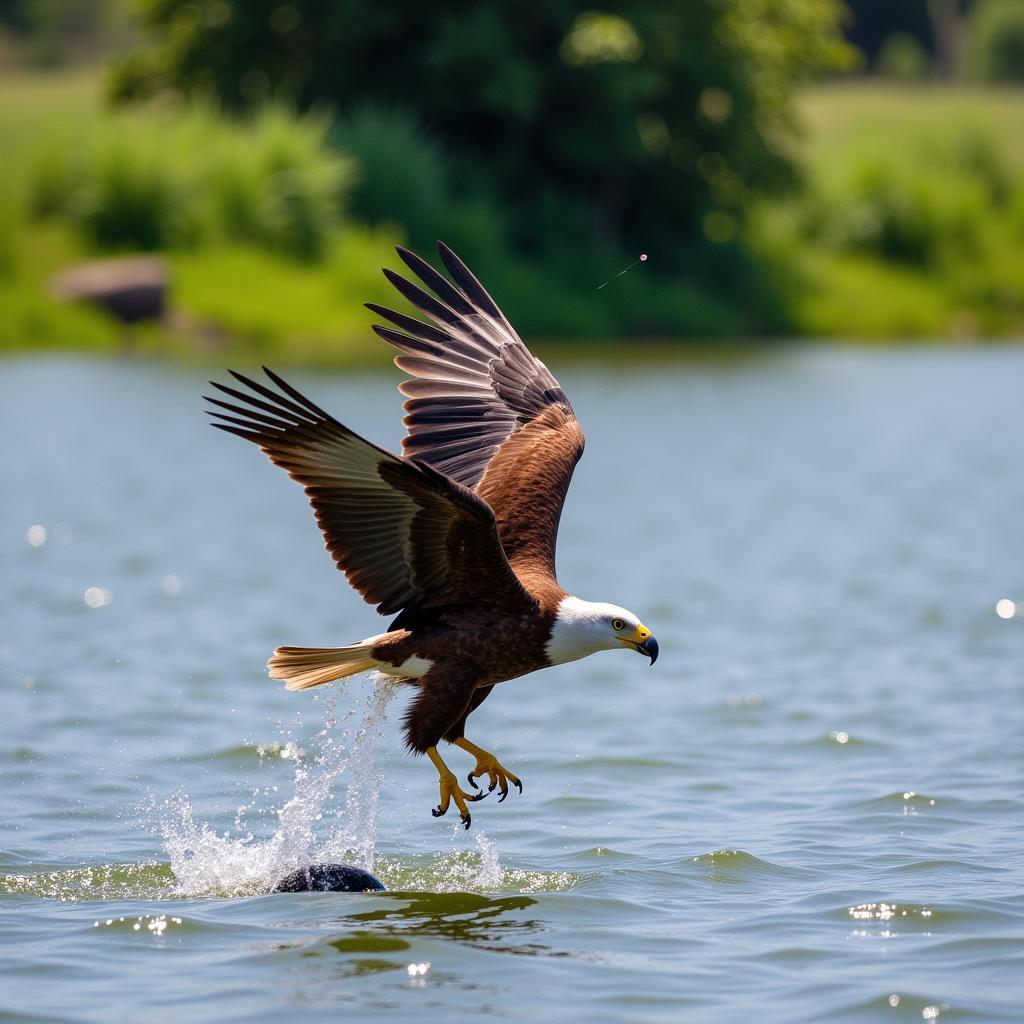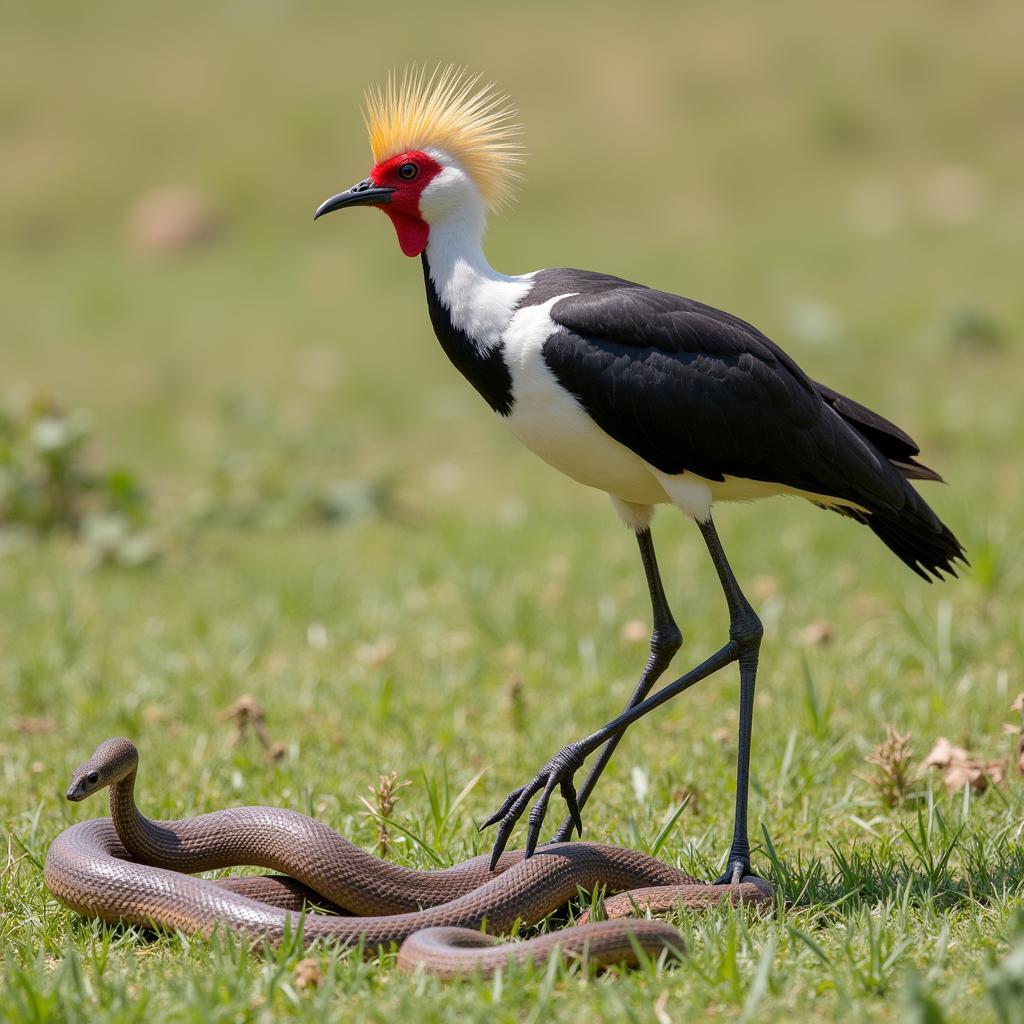African Birds of Prey: Majestic Hunters of the Sky
African Birds Of Prey, with their powerful talons and sharp beaks, are apex predators that play a vital role in the continent’s diverse ecosystems. These magnificent hunters, ranging from the mighty Martial Eagle to the smaller pygmy falcon, showcase incredible adaptations and hunting strategies. From soaring high above savannas to navigating dense forests, these birds have captured the imagination of people for centuries.
The Diversity of African Birds of Prey
Africa boasts a remarkable variety of raptors, each adapted to its specific niche. These birds are classified into several families, including eagles, hawks, falcons, vultures, and owls. Some, like the African Raptor, are specialists, preying on specific types of animals, while others are more opportunistic. This diversity ensures a balance within the food chain, controlling populations of rodents, reptiles, and other birds.
The African Fish Eagle, with its distinctive cry, is a common sight near bodies of water. Its specialized talons allow it to snatch fish from the surface with remarkable precision. Contrastingly, the Secretarybird, a terrestrial raptor, uses its long legs to stomp on snakes and other small prey.
 African Fish Eagle Hunting Fish
African Fish Eagle Hunting Fish
Hunting Strategies and Adaptations of African Birds of Prey
African birds of prey exhibit an array of fascinating hunting techniques. Falcons, known for their speed and agility, are masters of aerial pursuit, diving at incredible speeds to capture birds in mid-flight. Eagles, on the other hand, often rely on their powerful talons and beaks to subdue larger prey on the ground. Vultures, while not technically predators, play a crucial role in cleaning up carcasses, preventing the spread of disease.
These birds have evolved remarkable adaptations to aid their hunting prowess. Keen eyesight allows them to spot prey from great distances, while sharp talons and beaks are perfectly designed for capturing and consuming their meals. Some, like owls, have specialized feathers that enable silent flight, allowing them to ambush their prey undetected.
 Secretarybird Hunting a Snake
Secretarybird Hunting a Snake
Conservation Challenges and Threats
Despite their strength and adaptability, many African and Asian birds of prey face significant conservation challenges. Habitat loss due to deforestation and agriculture is a major threat. Poisoning, often unintentional, from pesticides and other toxins also takes a toll on raptor populations. Additionally, some species are targeted for the illegal wildlife trade.
Efforts are underway to protect these magnificent birds. Conservation organizations are working to raise awareness, protect vital habitats, and combat illegal hunting and trade. Understanding the importance of these apex predators in maintaining healthy ecosystems is crucial for their continued survival.
What are the largest African birds of prey?
The Martial Eagle and the Crowned Eagle are considered the largest African birds of prey.
What do African birds of prey eat?
African birds of prey consume a variety of animals, including rodents, reptiles, fish, and other birds. Some, like vultures, specialize in scavenging carcasses.
How do African birds of prey hunt?
Hunting techniques vary, with some species using speed and agility for aerial pursuit, while others rely on strength and talons to subdue prey on the ground.
Dr. Asani Mabena, a renowned ornithologist specializing in African raptors, emphasizes the importance of these birds: “African birds of prey are not just magnificent creatures, they are essential components of the continent’s intricate web of life. Their decline would have far-reaching consequences for the entire ecosystem.”
Another expert, Dr. Fatima Hassan, adds, “Conservation efforts must address the root causes of these threats, including habitat loss and poisoning. Community involvement is crucial for long-term success.”
Conclusion
African birds of prey are a vital part of the African landscape. These majestic hunters, with their diverse adaptations and hunting strategies, play a crucial role in maintaining the balance of nature. Continued conservation efforts are essential to ensure their survival for generations to come, protecting these magnificent african birds of prey for the future.
FAQ
- What is the most common African bird of prey? The Black Kite is one of the most commonly seen raptors across Africa.
- Are there any endangered African birds of prey? Yes, several species, including the Cape Vulture and the Madagascar Fish Eagle, are considered endangered.
- What is the wingspan of the largest African bird of prey? The Martial Eagle can have a wingspan of up to 2.6 meters.
- Where is the best place to see African birds of prey? National parks and game reserves across Africa offer excellent opportunities for birdwatching.
- How can I help protect African birds of prey? Supporting conservation organizations and spreading awareness about their importance are crucial steps.
- Are there any nocturnal African birds of prey? Yes, several owl species are nocturnal hunters in Africa.
- What is the difference between a hawk and an eagle? While both are raptors, eagles are generally larger and more powerful than hawks.
For more information on African wildlife, you can explore articles about the African desert fox, African bulldog frog, or even the impressive African giant snake.
Looking for more information on African birds and other wildlife? Explore our other blog posts related to African wildlife conservation and species spotlights.
Need support? Contact us 24/7: Phone: +255768904061, Email: [email protected], or visit our office in Mbarali DC Mawindi, Kangaga, Tanzania.
